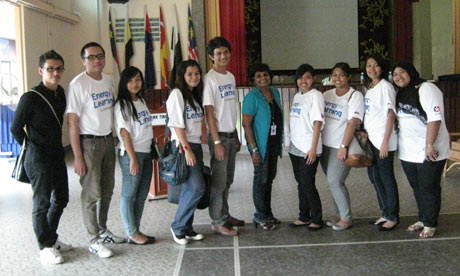
In my society, the word "sexuality" is very sensitive.
We don't discuss sexuality with the elders because they may think it's not the right time yet.
I once asked my mother why sexuality and sexual and reproductive health (SRH) issues aren't discussed. She told me that when she was younger, these issues were not discussed because people were ashamed; she was told she would learn by herself when she was grown up or married. That's Asian culture, we hide in our shells when it comes to this topic.
I'm a 22-year-old girl, if I had any problem regarding SRH I would not turn to my parents because I feel ashamed and uncomfortable to talk about it. I would search for my friends to talk to.
Other young people might have the same problem and feel uncomfortable to talk about it with their parents. That's why peer to peer education works. A peer educator is also a normal person who going through the same things as the normal teenager, so its not a problem to discuss about matters of SRH.
I became a peer educator in 2009 because I just wanted to spend my time doing something beneficial. I'm a youth co-ordinator, peer educator and facilitator for IPPF; I've been involved in talks, exhibitions, outreach activities in schools, juvenile institutions, higher institutions, shopping malls and public places, and worked on an outreach programme on HIV/Aids related activities funded by Malaysia's ministry of health.
All of these projects advocate and provide education, promote a positive approach to young people's sexuality and promote a non-presciptive, evidence-based and rights-based approach. These projects reach young people with diverse needs and sexual orientations.
Throughout out these projects, I have seen many young people still lacking knowledge about sexual and reproductive health and HIV/Aids.
When I think about what I have done, I remember that I have helped someone attain new and acccurate knowledge.
Whenever we finish a workshop, participants will ask me or my team members questions they have kept to themselves for a long time because they felt ashamed or uncomfortable to discuss them with an adult.
When you see someone asking questions or taking notes during a lecture, you are grateful because they are actually listening to us, to what we want to deliver.
By giving young people sex education, we can help them to make better decisions in the future. Some policymakers might think these issues are very sensitive and should not be discussed in public, but you cannot hide from them.
Take for an example, baby dumping. Why is this happening? This is because young people are not educated on how to handle the situation. They were not taught how to use emergency pills or condoms and when they get pregnant, they do not know where to turn for help. We cannot stop young people having sexual intercourse, but we can help by giving them choices.

